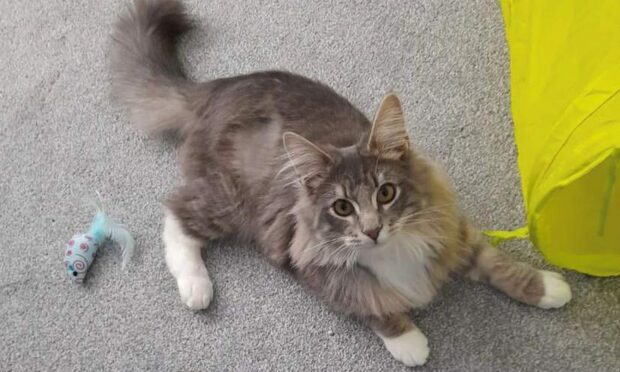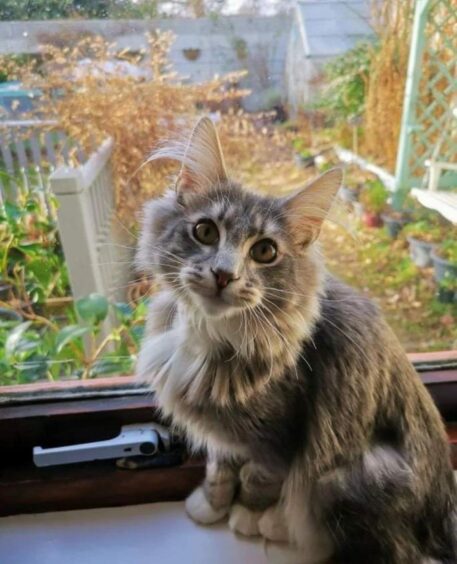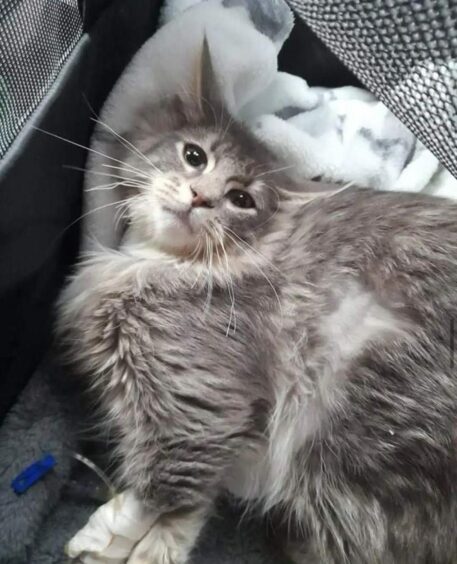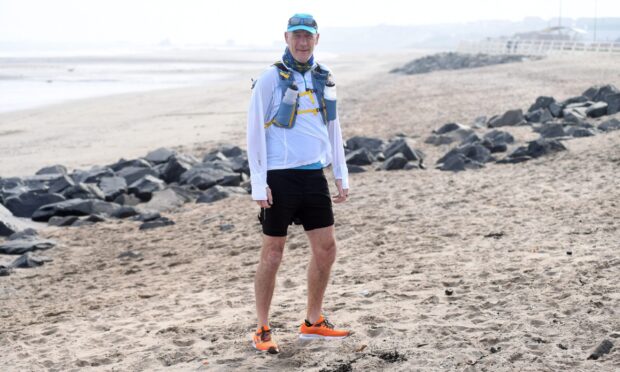A Dundee woman whose cat almost died due to a rare condition caused by feline coronavirus, is issuing a warning to other pet owners.
Elaine Patullo, 37, got her Norwegian Forest cat, Rafiki, in November 2021. But very quickly after coming home, Rafiki became unwell.
It was the start of a long battle to make sure Rafiki got the medication he needed in order to survive. Plus challenges with insurers and an eventual bill of £18,500.
Elaine explains: “We’d had Rafiki for three days before he became unwell. He ended up diagnosed with parasites, which are quite common in kittens and puppies.”
Feline coronavirus
During tests done to identify what was wrong, it was discovered Rafiki had feline coronavirus (FCoV) – a common viral infection in cats.
Nearly every cat exposed to the virus from other cats will become infected and most will remain healthy. The majority will clear the virus themselves.
Elaine continues: “Towards the end of December, he went on to be unwell again. The vet didn’t really know what was going on.
“After New Year he went dramatically downhill and was admitted to the vet again.
“There were various tests done that used up quite a lot of the insurance policy before we’d even got started.
“That battle went on through the first week of January and then he became unable to stand or move.”
Community support
In a very small percentage of cats, the virus mutates and causes a fatal disease called feline infectious peritonitis (FIP).
Her local vet was unable to treat Rafiki, so Elaine took him to Glasgow University Small Animal Hospital (GUSAH).
There it was discovered his feline coronavirus had indeed developed into FIP.
All cats with FIP are unwell. Most will have a fever, appear lethargic and go off their food.
Before last summer, cat owners had few options as no medications to treat the condition had been legalised in the UK.
In researching her options, Elaine came across a story similar to hers in the Romford Recorder, which told her about a newly legal medical option for cats with FIP.
Elaine says: “I messaged this lady from Romford on Facebook, whose cat had FIP. She spoke to me for over an hour.
“She said I needed to tell my vet they could get this medication and it was legal, so that was the route we went down.
“GUSAH saved the day, to be honest. They listened to us and the research we’d done on the medication.”
‘It was a miracle’
After just three doses of the medication, Remdesivir, Rafiki began to show significant signs of improvement.
Elaine adds: “It was a miracle, really. After 14 days he came home. He was given pills and completed 84 days on them.
“Now, he is pretty much 100% a normal cat. His recovery was absolutely miraculous. You can see the transformation, it’s unbelievable.”
Rafiki made a remarkable recovery, but that wasn’t the end of the story for Elaine.
Elaine was told their insurers wouldn’t cover their bills because Rafiki had tested positive for FCoV within the first 10 days of their policy being taken out.
As a result, she is now facing vet bills of £18,500 and has set up a GoFundMe page to help with paying them.
She wants her and Rafiki’s story to serve as a warning to other cat owners and to raise awareness about the rare condition.
She says: “I want his story to highlight that we tried our very best and put insurance in place. We’ve used it before for other pets and never really needed it.
“We assumed – maybe wrongly – that if he became ill, we’d be covered to some extent – maybe not for everything, which is fine.
“But, I certainly don’t want cat owners to panic. Feline coronavirus is common and only a very small percentage of cats have it turn into FIP.”
‘New treatment’
Dr Kate Stalin, senior clinician at the University of Glasgow Small Animal Hospital said: “Over the last few years there have been a number of breakthroughs in the treatment of FIP.
“Through the dedication of this owner, we were able to offer a new treatment with Remdesivir, an anti-viral medication which has been used to treat severe Covid-19 cases in humans.
“Thankfully Rafiki made a fantastic response to the treatment, which marks a real turning point for treating cats with this terrible disease.”














Conversation